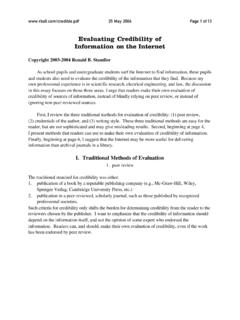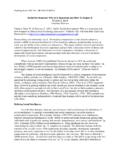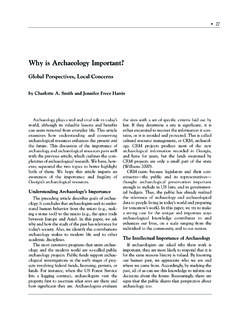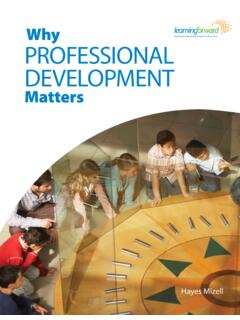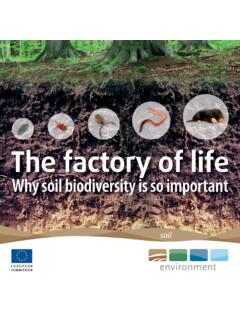Transcription of What Is History and Why Is History Important?
1 Feb 2013 Page 1 of 5 What Is History andWhy Is History Important? Copyright 2011 by Ronald B. StandlerTable of ContentsWhat Is History ? .. 1 Why Is History important ? .. 2My Own Experience .. 3 What Is History ? History is the study of some subject in chronological order: tracing ideas back to their originand studying the evolution of ideas or events. History is most commonly used to studygovernment and politics, but History can also be used to illuminate other topics, such as science,technology, or law. A biographer writes a History of one person and how that person changed orinfluenced society.
2 The essence of History was tersely expressed by Prof. Ronald Edsforth at Dartmouth College: I sought answers to three questions: what happened, what happened next, and why? 1 In this sense, History is not really an academic subject (unlike mathematics, physics, andchemistry), but rather a method of understanding the evolution of ideas. Anyone who readsprimary sources ( , old books, articles in old periodicals, old newspapers, old judicial opinions,etc. where information on a topic was first published) is collecting historical facts. The realaccomplishment of a historian is to present the historical facts in a coherent way, by addingoriginal explanation for why the facts its least appealing incarnation, History is about memorization of important events and theirdates.
3 While such factual information is part of a historical approach, for me the real significanceis in understanding the evolution of ideas and understanding why ideas Faculty biographies, History Department, Dartmouth College website, viewed in February 2004,but this quotation had disappeared by March Feb 2013 Page 2 of 5 Like a scientist, a historian needs to be skeptical. Sometimes a source contains statements thatare not plausible and need more investigation. Many times, one encounters conflicting facts indifferent sources, so a historian needs to make a choice about which fact is more credible.
4 Why Is History Important? A study of History shows that people, both individually and as groups or nations, repeatedlyencounter the same kinds of problems. If we understand how and why we responded to aparticular problem in the past, and if we also understand the results of that past response, maybe2we can develop a better response when the problem occurs again. In this context, History is usefulto predict the results of a contemplated response to a problem. History can be inspirational: reading about the courage of some hero may inspire a reader toalso be courageous and probably wind up as a martyr, since people in power resent challengesby courageous or principled people.
5 Reading a biography of a scientist might inspire a youngstudent to persevere and work diligently for tens of years in the quest to understand is conventionally understood that History gives a group of people ( , a nation or state) asense of identity. For that reason, schools commonly require that pupils be taught the localnational History . Personally, I wonder if teaching national History is a good idea. The content ofnational History textbooks seems to be to glorify the nation, to explain why we are better thananyone else, and to justify why we should impose our religion, our system of government, andour values on other people in other parts of the world.
6 In this sense, national History istransformed, from an honest intellectual understanding of both good and bad accomplishments,into dogma and jingoism. Once a nation believes that they are better than anyone else, they havean easy excuse to invade their neighbors or to smite anyone who irritates them. A more credibleway of studying national History is to read books written by historians who are citizens of othercountries, who look at a nation from outside, which gives those historians more I say maybe because I am not optimistic that man s intellect can triumph over emotions andprejudices.
7 There are many examples in the world of wars or other conflicts that continued for at leasttens of years between two groups of people with different religions or different cultures ( , Catholicsand Protestants in Ireland, Jews and Muslims in Israel/Palestine). An intellectual understanding ofthe reasons why they fight, and the History of their fight, is not particularly useful in stopping thefighting, because people fight for emotional reasons ( , retaliation or revenge) or because Feb 2013 Page 3 of 5 My Own ExperienceI was a full-time physics student continuously in universities for ten years, ending whenI earned a in physics in 1977.
8 Because I was interested in how ideas evolved, in 1968I petitioned for and received a waiver to minor in philosophy of science, instead of theconventional undergraduate minor in chemistry accepted by most physics majors. Outside of myassigned work in physics classes, I read many books on the History of 1971-72, I did a manual search of printed volumes of Science Abstracts to find articleson the physics of lightning and thunder. I collected an entire file-cabinet drawer full of photocopiesof articles, which I intended to use in my career in scientific research, and perhaps in eventuallywriting a book on atmospheric electricity.
9 My master s thesis in 1975 cited a total of 75 references in the bibliography, most of whichI laboriously found with a tedious manual search of printed volumes of Science Abstracts. In contrast, a typical thesis in physics might have a half-dozen During my career in scientific and engineering research during the 1970s and 1980s, I oftenread old books, old journals, and old patents, to trace ideas back to their source. I repeatedly foundthat the original discoverer of a fact, or the original inventor of a new technology, explained thediscovery more clearly than later textbook writers.
10 This result is easy to understand: the originaldiscover probably spent at least hundreds of hours agonizing over the development of his newidea, while later textbook authors had only a superficial encounter with that idea, and which thetextbook authors always saw in its modern, fully developed state. One of my longstanding interests is in how and why scientific ideas evolve. In particular,I am interested in the psychology of In the previous paragraph, I remarked about thevalue of articles in old journals. The original discoverer often mentioned hints about how or whyhe made a discovery or invention, information that is not repeated in science and engineeringtextbooks, which tersely concentrate on A total of 75 items in a bibliography is unusually long in physics or engineering, althoughlonger bibliographies are common in History , law, or biology.

